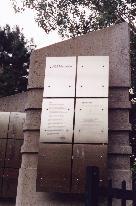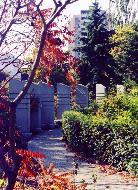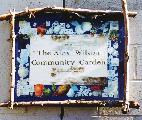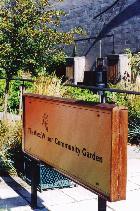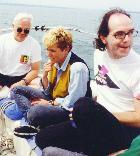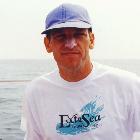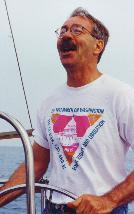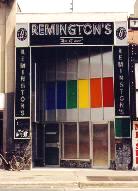|
Promiscuous Affections A Life in The Bar, 1969-2000
1992-1995:
|
|
Mute, yet a speaking presence
That 14th pillar may be the last. From 1996, new plaques using smaller type hold many more names than for years before. Over time the older plaques will also be redone to carry more names.
For other views of the Memorial see Church & Wellesley: Photos in the CLGA site.
|
|
Alex's own memorial
|
The Alex Wilson
Community Garden
Known for his works (written & literal) on landscape, Alex had a garden, reclaimed from an urban lot near his house on Stafford St. After he died friends tried to buy & preserve it. The effort failed at that site but found another: a 10 x 34 metre plot on Richmond St, near Portland. A sign (top, above) marked it while still a vacant lot.
A design competition drew 147 proposals, 67 with models all done to the same scale. On May 28, 1997 at the Design Exchange, all were lined up as if on a curving street; the winning plan, by Kent Ford, Catherine Dugmore & John Holmes, displayed on the walls. The exhibit opened with a tribute to Alex, Douglas Chambers & mayor Barbara Hall among the speakers.
The garden cites local geography, from wetlands to meadow to bush, & includes plots where neighbours can grow flowers, even vegetables. Its sign on Richmond carries a bit from Alex's The Culture of Nature: North American Landscape from Disney to the Exxon Valdez, beginning:
"We must build landscapes that heal, connect and empower, that make intelligible our relations with each other and the natural world."
1993
June through (nearly) December
The permanent AIDS Memorial was officially opened on the afternoon of Saturday, June 19, about 400 people there under umbrellas in a light rain.
I'd been to Cawthra Park to see it being built. Even when it was no more than a long sweep of ditch, a row of foundations down in the mud, I had found it powerful. I thought of workers toiling away on it, making real what had once been, though I doubt they knew, simply an idea in the head of Michael Lynch.
The design competition for the Memorial, launched in 1990, had set clear criteria, among them: "It must acknowledge the need for private meditation and remembering; It should in some way be able to function as a focus for public gatherings -- in mourning, anger, celebration; It should take its place in the everyday life of the park."
It should also cost no more than $75,000, to be raised through community donations. That would be raised, and more, ensuring the site's maintenance, and its expansion. The Memorial was to be in the safekeeping of the city run 519 Church Street Community Centre and a volunteer committee, looking after its landscape, and the addition of names each year.
There were dozens of submissions, all displayed during Pride Day 1991, the winner to be selected by a jury: Michael Lynch; John Klintworth, a curator (and once Michael's boyfriend); artist and filmmaker Lynne Fernie; architect Bruce Kuwabara; Kyle Rae, director of the 519 and later city councillor; designer Virginia Wright; and Alex Wilson.
On that Pride Day, I had rolled Michael Lynch in his wheelchair through the temporary Memorial. At the end I got to set in his lap the permanent one, a model of the winning design. So he did get to see it, if never seeing it built.
***
That design, by Patrick Fahn, amply met the criteria. Names and dates engraved on stainless steel plaques were to be set on concrete pillars, six on each, in order by year of death.
The pillars would border a curved path traversing a gentle hillock, already there. Framed by the path a low spacious podium was planned, a triangle with a few steps at the front.
That podium could (and would) serve as a gathering place, for everything from AIDS vigils, to strollers sitting as their dogs played, to cruising -- long part of the everyday (and night) life of Cawthra Park. In time the shrubs planted between it and the path would grow tall, making the walk along the pillars a place of private remembering.
Now it was done -- if it would ever be truly done: nine pillars with room for more, their foundations already in. On the first pillar the plaques were blank, but for two. One read "AIDS Memorial"; the other carried Michael's poem "Cry," published in the 1989 collection, These Waves of Dying Friends. Another poem, for those unnamed who had died of AIDS, would be added later.
Patrick Fahn's design allowed his half circle of pillars to become a full one, crossing the path at the foot of the podium and out over a flat lawn. That likely won't happen, more names added to each plaque instead, the type made smaller.
The AIDS Memorial Committee likes the idea that this circle may not be closed; that it may someday -- decades, even centuries from now -- honour not only the dead, but the community that found ways to break this sudden yet lingering cycle of death.
***
I saw Alex Wilson there. We'd hardly been in touch since 1981 and our unhappy days at The Body Politic. But I had seen him sometimes at Michael's while I was on his care team, Alex and I fine with each other by then, if not close. Our past was past.
He tended the garden there; I think he helped Michael and Bill plan it. He had planned the landscaping of the AIDS Memorial and was there, on the arm of his lover, artist Stephen Andrews, walking with a cane.
I imagined he could see what the site would look like years down the road, the bushes and trees newly planted, still small, straggly, grown up into what he'd envisioned.
Alex never did get to see that. In October I would again be at the chapel in The Necropolis, for his funeral.
I didn't go read names after the opening ceremony. I'd done that the night before, with a friend, when it was quiet. I had found Michael Wade then, right beside him René Highway, a dancer, brother of playwright Tomson. That jogged my memory.
A month before I'd been in the garden at Roger Spalding's house, there to remember David Sanders. I had known him but not well, David so reserved. He had lived at 48 Simpson for a time, his housemates Jim Bartley and Brian Pronger (who'd bought the place after the TBP menage moved out, keeping it in the family), never even knew he had AIDS.
He later moved to Roger's. They'd been lovers long ago. Looking at pictures of David there I felt I'd hardly known him -- as I'd hardly known others now gone, much as they'd been in my life.
Later, I dug in copies of my letters to Jane, looking for every death I'd ever noted. I made a list: there were more than 50 names. I had seen 25 memorials, celebrations of life; whatever. Funerals. In my count I had missed René Highway.
Tomson Highway's 1998 first novel, The Kiss of the Fur Queen, would recount his and René's lives, the best bits in Cree. It was fiction, of course. And truth.
***
In February I had missed a funeral. Early that month Robert Trow found me on Wellesley Street and asked: "Have you heard about Victor Bardawill?"
Victor had never been tested for HIV, never wanted to know he was sick even when he clearly was. He'd been found unconscious in his apartment, what he'd dismissed as a cold actually PCP. On Sunday, February 28, Gerald called to tell me Victor had died.
No more barks from the Squirrel. His service was two days later. I had an appointment that day at Sunnybrook; I decided I'd best keep it.
At noon on Sunday, June 27, Lesbian and Gay Pride Day, a series of speakers stood at the AIDS Memorial and read out all 1,012 names so far recorded there. Alan Miller got the list for 1990 and thus got to say, "My boyfriend, Gram Campbell." I wrote Jane:
-
At the end they released from behind the pillars hundreds of red balloons -- perhaps 1,012 of them, I don't know -- and they sailed into the sky just like all those lives.
That was hard, watching them fly out of sight.
***
|
History in the harbour
|
Two days before I had sailed with people blessedly alive, still old Beepers at heart though The Beep was long dead.
Sue Golding was in town from London, Robin Hardy from Tucson where he'd moved from New York. Both were here for the funeral of Jamie Hart, lover of Bob Gallagher, perennial bath raid demo marshall, now assistant to a municipal councillor.
Philip Fotheringham -- he of Doing It! in 1982 and Robin Hardy's lover then -- had bought a sailboat, his ExtaSea Cruises making jaunts through the harbour and out to the lake beyond. He offered us a free ride. I'd been on one before with among others Chris Bearchell and Danny Cockerline.
Danny wasn't on this trip but Chris was, her girlfriend Irit Shimrat (an anti psychiatry activist), Gerald Hannon, Ed Jackson, Sue, Robin, Bob, and me. Philip couldn't do his skipper's spiel until we were well out on the lake: it took him that long to get a word in among this crew of old politicos, as ever endlessly yakking.
We sailed far out, anchored in a cove at the Leslie Street Spit and ate hot dogs, the city a jagged skyline far off in the haze. It felt like a reunion (as indeed it was), people together once for a purpose now together just to remember it, though each still, in his or her own way, worked on, thought hard -- and heaven knows talked and talked.
All that history, lived, known; now, I said to myself, floating out here in the sunlight across the lake.
In a backhand response to city councillor Kyle Rae's contribution to the mess at the AIDS Committee, knocking dinosaurs of old, we dubbed it the Jurassic Park Cruise. I sent Jane pictures.
***
Six days before ACT's annual meeting, set for June 16, three members of the board of directors called a less formal one. They wanted to bring in a consultant, asking some of their known critics to come talk about it. I was one of them.
They heard that no plan would be credible if it still included Bob Martel. Believe us, they said, we hear you. One of them, Russell Armstrong -- I had known him as a pup working at Glad Day, writing for TBP -- was interviewed in the local weekly Now and had said: "We're in a bit of a mess. We don't know what it is we're supposed to be doing."
At ACT's annual meeting, Bob was not there. He was gone. Whether he jumped or was pushed no one cared. More than 160 people were there; the event usually drew a few dozen. Board members raked over the coals confessed their sins, apparently forgiven: two did not stand again; those who did got back on. The two new ones had been recruited by renegade volunteers and coached by, among others, me.
At its first meeting the next night, Russell was elected chair. The very next day he set up a board team to meet with staff. "I can work with these people," Ruthann said. So could I, so I went back, if at first only part time, and did.
They were still wary of us, wanting to bring in someone from outside right away as interim director. Ruthann and I convinced them not to rush into it. Within a week she was named Acting General Manager, the old Management Team becoming the Transition Team. I was on it, my main job at the end of each meeting to get its minutes out right away -- to everyone.
Nothing would be secret now. We'd rebuild the place out in the open with everybody involved.
***
With that ACT exploded again -- with ideas, discussion, and cooperation of a sort not seen for years. Critiques of our own and each others' work, for so long blasphemy, were openly aired and met with resolve to find better ways to do things.
And we found tools for shaping those better ways: the concepts of health promotion and community action. These were not new ideas. Some sense of them had guided ACT's work for years -- but that sense had been implicit, unarticulated, not fully shared.
In our navel gazing we had ignored explicit, articulate and well founded thought on these fronts, and hence when in crisis had reverted to the rules of the supposed "real" world: hierarchy, discipline, and good old fashioned "social service" of the sort dished out by government bureaucracies.
We should have trusted our gut -- and read more.
In 1986 the UN's World Health Organization, Health and Welfare Canada, and the Canadian Public Health Association had produced The Ottawa Charter for Health Promotion. The most concise (if not simple) definition of health promotion was: "action by people to meet their own, self determined positive health goals, through personal, group and community development in a context of supportive environments."
The charter defined health not just individually but socially, environmentally, collectively -- in short, politically. It was about self determination, choice, the power to shape one's own life and the life of a shared community.
To most of us at ACT these ideas rang familiar, fundamental to the politics we'd practised for years. Now no less than the United Nations had written them down, spread them all over the world. I showered ACT's staff and board with copies of the charter.
Its concepts came to shape most every discussion -- at least among staff; every idea on how we might do better what at heart we knew how to do already. The place was suddenly alive again, vital, people positively excited at what we might achieve.
***
We saw other people as "communities" we went out to work with -- but gay men as individuals, free to walk in any time. Many didn't.
And why should they have to walk in? Why weren't we out there with them?
That excitement went beyond ACT's walls, as much of ACT's work was meant to.
In 1991 Yvette Perreault, with fellow AIDSupporter (and HIV Caucus member) Wayne Fitton, had done some bereavement counselling with the employees of Chaps and Woody's. They had faced many deaths and would likely see more: of the 60 people then working in those two bars, half were HIV positive.
After Wayne and Yvette's work there the staff picked up on it, taking it beyond "grief work" to the work of daily life, going on to meet in groups set up on their own.
Here were people dealing with AIDS not as individual "clients" of ACT, but organizing themselves based on what they shared: the place where they worked together. Around the same time, others were organizing on a different basis: where they lived.
Doug Wilson -- a gay activist since his days in Saskatoon in 1975, once a federal candidate for the NDP -- was a force in that effort to start a national organization of people with HIV. That never came to be. But Doug had gone around his own apartment building looking for such people.
It was 55 Maitland Street, in The Village Green. He found 57 of them. They became Network 55, a mutual support group made up of neighbours.
This was what ACT as a community organization was meant to foster: "action by people to meet their own, self determined positive health goals," to quote The Ottawa Charter. And ACT had -- but rarely among gay men.
We saw other people as "communities" -- Black, Asian, Hispanic. We saw women, immigrants, and IV drug users as people we could best help by cooperating with groups already working with them. Many such people hesitated to come to ACT -- because it was gay, in fact if not in name.
But, for the same reason, we'd seen gay men not as a community but as individuals. We were there for them: they could walk in comfortably any time they wanted. But many didn't: Doug Wilson found quite a few at 55 Maitland who had never been to ACT, just a block away.
If our work was meant to be rooted in community, why should they have to walk in? Why weren't we out there with them?
***
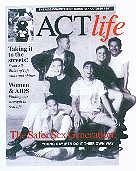
The Safer Sex Generation: John Maxwell (middle left) in his first community effort, as a volunteer, 1991. ACTLife was meant to be a quarterly; this Oct '91 issue the only one I got out. For more on John & his later works, see Sex: Policing desire, playing politics, pushing pills (all of which -- but sex -- his community education efforts blessedly avoided). |
More and more, ACT would be. In 1991 the education department had begun looking for someone to work specifically with gay men out in the community. One of the applicants was John Maxwell.
John had been at ACT on a part time contract, a tall, thin boy, even a bit gawky, with a bright, big featured face under close cropped hair. I thought he was gorgeous, once told a friend of his I did. "Well you should tell him," he said. "John just thinks he's funny looking."
HIV positive status was, for once, among the stated criteria for the job: not essential but helpful in doing it -- and in getting it. No one in on the hiring process knew John's HIV status. But he got the job, on his other merits. Later he said he was positive, had known when he applied -- but was not about to sell himself as yet another Professional Person With HIV.
I was shattered when he told me he was infected: Johnny was one of those smart, strong boys I'd thought I was doing this work for, so he could stay healthy and vibrant and beautiful and just go on and on.
He did. Years later and on no antiviral drugs, he's still healthy, his HIV count undetectable. He's still gorgeous. And still at ACT, now as director of what had been the education department. It's now called Community Development, doing the kind of work John helped pioneer and has done, brilliantly, ever since.
He's a survivor not so much of HIV as of ACT and the messes it made of AIDS work. He would be among the people with enough forbearance to get ACT past all that.
***
In time it would be past, mostly, but it would be some time yet. In the suddenly bright, hopeful summer of 1993, ACT's staff and many of its volunteers were ready to move beyond the mess they had just survived -- if some had just barely; a few not at all.
When an outside retreat was touted to "help the healing," people shrugged. Why bother? We've had enough therapy, let's just get on with it. Not everyone was so happy. When Ruthann Tucker told one board member how good staff moral had got, he said: "Well of course they're happy. They won."
The joyous interregnum would be brief, the board soon finding a new queen bee. For some, she would bring sweet revenge.
***
|
Take it off
|
It felt like what it had been, a strip bar: a dark cave where straight men sat grimly intent on women grinding out a parody of seduction.
Even when it was gay men watching boys, it could feel much the same.
- Monday, July 5, 1993, 8:30 pm, to Jane:
An hour ago I was sitting with Ricky lying in my lap, kissing his neck just like I used to do at Colby's -- except at Colby's he wasn't naked. It was at a new bar called Remington's, where at last he's got a job.
I had a small hand in this. Remington's -- really the old Colby's establishment, same management, mostly the same boys -- is licensed for adult entertainment, hence the nakedness, and to dance there Ricky had to be licensed too. It costs $160 (such inventive ways the metropolitan government finds to make money!).
I lent it to him (writing a cheque so he couldn't spend it the night before!). I made it a loan to say, and did say: this is an investment in your ability to make an income on your own. Everything else I've given him he has simple frittered away and I can't afford to go on financing that.
But helping him get set up -- well, that's worth the risk.
Colby's had never had an adult entertainment licence. The city had stopped issuing them in an attempt to control the trade, so the only way to get one was to buy a place that already had one. George Pratt did, the former Bermuda Tavern, a straight strip club.
Rechristened Remington's, it became the only club in town where boys dancing for patrons' pleasure could (legally) take it all off.
***
The place was not at all like Colby's, where not only the use of space was varied over time but the space itself was, too.
Coming in the door there one faced the long side of an L shaped bar wrapped around a mezzanine head high behind the bartenders. To the right just a step or two up was an area framed by an open shelf with stools behind it. Beside the bar was another one; both had pool tables. To the left was the dance floor / stage.
There were lots of places to sit, nearly all with a clear view of boys performing on the floor or slung off the brass poles pegged into each end of the long bar. The mezzanine had two stairways, making a circuit you could wander to find a congenial spot.
Remington's, in contrast, was as varied as the inside of an empty boxcar -- and of much the same proportions: just a few paces wide but a long, long walk to the back, standard for a commercial lot fronting on Yonge.
Colby's had some windows and decor not too dark; Remington's front panes lit only the stairs (until later done up in rainbow mylar); the spaces inside were painted black, as a foil to the tiny twinkling Christmas bulbs strung across the ceiling.
Upstairs and down were much the same, though with the bar at the back on the second floor, private dance booths beyond, a few more at the front. On both floors there was a stage on one of the long walls, just a big box really, maybe three feet high.
The one downstairs had a runway leading in from the back, great for dramatic entrances, but in time it was torn out to fit in more seating. After that the boys just plodded in and climbed up onto their box.
There was no circuit but that long back and forth from front to back (or, with the second floor open, up stairs at the front, down again at the back, then forth to the front and maybe back again). One passed people packed along the walls and, by the stage, a boy maybe waving his dick over one's head.
It felt like what it had been, a strip bar: a cave where straight men sat grimly intent on women grinding out a parody of seduction. Even when it was gay men watching boys it could feel much the same.
Nonetheless, there it was, naked boys on view (again many of them much too bulky to seem boys), nearly naked ones strolling around scouting business. When they bothered; some could look quite bored.
***
But etiquette dictated you didn't do private dances with your main boy's best buddy -- though it was polite to tip him dancing on stage.
In the afternoons when Ricky was on there wasn't much business to scout. But he was diligent despite the fact that tying off -- a leather thong tight around the root of his cock and balls -- didn't make his modest dick much less modest.
I did once want to tell the man beside me ogling him: this boy sits in my rocking chair and dips cookies in his milk. He did get better at it, but I sensed his only real pleasure there came from a few of the other boys.
You could see this with many of them, judge who was buddies with whom. When they were truly bored -- and weren't loners; there were some, often forlorn -- you'd see gaggles of them together, finding each other much more engaging than any of their potential customers.
In late July I was there on a Sunday afternoon, 4:30, practically alone but for the bartenders, Ricky and a few fellow dancers. Two of them were his buddies, Darren and Ray. He was living with Ray now, a sumptuous dark haired boy with a big grin and bouncy moves.
Darren I had know at Colby's as Tex, but now the cowboy hat was gone and he was just Darren. He was Ricky's protector, there and out working "the stroll." "He's my little brother!" Darren would beam, their affection real, and physical.
At Remington's he once snuggled with Ricky as he and I sat with Norman Hatton, hugging him from behind, reaching down to cup his crotch, all of it comfortable, genuine -- even if, as Ricky broke his hold, Darren had to laugh it off, clutching his own crotch and saying, "Aww, and I was just getting hard!" He had a girlfriend, no more rare among these boys than stage names.
Darren was a redhead, another one, always fascinating to me if of a certain type. Darren was. He had a crewcut, often bleached, a light dusting of freckles on alabaster skin. He was compact, his muscles lush but subtle under his smoothness, his bottom a ripe peach. He looked juicy.
I'd have done Darren in a second, Ray too. But etiquette as I read it said one didn't do private dances with the best friends of one's main boy -- certainly not while he was there, maybe not at all -- though it was polite, even advisable, to tip them when they danced on stage.
On that Sunday, Ricky dancing on stage hoisted himself up on a pole for a slow, seductive slide down -- and fell off. I was glad the laughter was coming from friends. He laughed, too. When he came off stage he, Ray and Darren fell all over each other at the silliness of it all. I so liked their physical ease together, these boys not self consciously gay.
Ricky and I sat holding hands after his set, the place quiet enough that our affection had few prospective customers to dissuade. He smiled a lot, rubbed his back where he'd fallen, and when I left offered me his cheek for a kiss.
I told Ray I sometimes felt in Ricky's way there. "No," he said, "he really likes seeing you. And let me tell you, it's nice to find somebody here you like. And trust."
***
"What?"
"That I love you."
But he had. I said so, said I loved him too. I did, & wished that could be of more use to him.
Ricky and I were out together often, an odd pair: an unassuming man in his 40s with this tall, thin teenage kid in bright baggy clown pants (big among boys then), odd blue sunglasses perched on the bend of his nose and hair shaved on the sides but long on top, pulled into a ponytail high on the back of his head.
Wandering down Yonge Street, its video arcades obligatory stops, that head would spin at motorcycles, cars, girls -- everything he wanted. Ed Jackson found us once and later asked: Isn't it hard having him cruise girls when you're with him? I said no, it wasn't about me. Yet there we were, together.
Sometimes it wasn't about me at all, even when we were together at my place. Bored one night, eager to party, he got out his little black book and called seven girls in a row to see what they were up to -- all up to something other than him.
Another night it was old johns whose numbers he'd got: "So, are you doing anything right now?" No takers. "You can't just spring it on them, honey," I said, "you have to make dates."
He and I were fine with each other still, but he -- nitzy, scattered, hugely romantic -- wanted things I couldn't offer. He'd go out clubbing with Darren and Ray, picking up girls and taking them home together: they'd get laid; he'd be told he was "cute" by some sweet thing who'd then fall dead asleep.
He once told me that he and Darren planned to enlist in the Armed Forces Reserves -- "the militia" he called it, his cultural referents coming from video games. Nothing came of it.
***
On August 15, a Sunday night, he came to visit, dejected. The job was off: he'd called Remington's to check his shifts and was told they didn't want him anymore. He was too skinny, they said: 5' 10" and 120 pounds not their vision -- a rather banal one -- of what turned customers on.
He had half a mind to go to the labour relations board, not about his firing but about pay. He hadn't been paid, as licensed adult entertainers were apparently supposed to be. Boys at Remington's worked solely for tips, in fact had to pay the bar: $15 a shift, ostensibly for the DJ who played the songs they wanted; $25 if they left during shift with a date for a private show.
I gave him the number of Maggie's, a sex workers' rights groups (Chris Bearchell had been on staff there, Gerald Hannon on its board). But nothing came of that, either. So now for money there was just the stroll, Darren I hoped with him: Ricky's back up protection was a small knife he kept in his butt pack. It made him as nervous as it did me.
I told Jane about that night.
-
It had been raining. Ricky went out on the balcony to see if it had stopped, antsy as ever, planning to go find Darren on the stroll, but stayed out there long enough to tell me he wanted me with him. I went out, held him a long time. He's not simply broke but lonely, thinking it's time to get out of this life, out of the city.
He said to me: "I don't know if I've ever told you this...." "What?" "That I love you." But he had told me. I said so, said I loved him, too. I do, and wish that could be of more use to him.
***
A few months later he'd tell me he was off to Venezuela -- to get married. It wasn't romance, inclined as he was to that affliction, but an immigration deal.
He'd met the girl at Bar 1, had known her maybe 10 days; she would pay for the trip. A friend of mine worried he was being recruited as a mule to run drugs. It would turn out more innocent if no less bizarre.
He didn't have a passport, didn't know a doctor or lawyer or priest who could serve as guarantor, but there was a form he could fill out in lieu of that and have it notarized. I helped him with the form, checked the Yellow Pages for a notary public, sent him off with the fee -- and with grave doubts.
The next day the Passport Office called me -- wanting only to know what he looked like. He got it. As I wrote to Jane then:
-
The fates must indeed protect him -- though I do marvel that life can sometimes be as fantastic as Ricky's take on it. I have never known anyone with as weak a grasp on reality as this boy. He called on Saturday, wanted to come over, but I was just about to leave for Paul and David's, likely not back before 10.
"Oh," he said, "I have to be at the airport before noon, so I guess not. But I got my hair done!"
***
"Heaven knows you & I do not come from the real world."
-- to Jane, on ACT under its
"turn around" guru.
In late July ACT's board had hired an interim director. Carol Yaworski, once with the Ministry of Community and Social Services, had gone freelance as a "turn around" guru adept at getting wayward organizations back on track.
She had sat at bargaining tables for both unions and management. She gave great spiel. She was exactly the sort of "professional" that community groups hire when they no longer trust their own instincts. She was also engaging, even funny. A big woman, she liked to joke that she was "gravitationally challenged." I decided to give her a chance.
ACT had just posted a job offer for a permanent finance clerk -- Gary's job. I'd been pushing to have the role upgraded to include computer skills, much needed: I was now in over my head trying to run ACT's growing network. Gary had been helping me, his skills well advanced on mine. I'd need help whether he got that job or not, though of course hoped he would.
But the posting was for a lowly clerk, period. Gary would have to apply if he wanted to stay after his contract expired on August 31. The decision was to be made on August 29: he faced being out of a job with just two days' notice. He was angry, fretted to me. I urged him to put his grievances on paper.
In her first meeting with the Transition Team, I watched Carol carefully as she read Gary's memo. This, I sat there thinking, will be the litmus test.
She flipped through, paused, and then said: "Where I come from this would be grounds for disciplinary action. Especially coming from a junior member of staff."
She popped off a potted analysis of Gary, whom she'd barely met: young, pushy, promoting himself. As for his helping me with the computers: "He's done us no favours."
Now I had her number. Faced with a grievance (if not a formal one; there was no contract yet), her impulse was to retaliate -- the one thing any good grievance process (I had studied lots of them) says a manager must not do.
Faced with a chance to let someone develop new skills, she said it messed up neat, limited job descriptions. Faced with a smart, eager young worker, she said that "junior" staff must be kept in their place.
***
Now I saw which way this turn around whiz was likely to turn ACT. I can't do it again, I said to myself, can't break in yet another director whose impulses are wrong and that I haven't the energy left to challenge.
For a while I did try. But I was not sufficiently "senior" to warrant serious attention. Along with another union member brought onto the Transition Team in the brief interregnum, I would soon be off it as it became again the Management Team: Carol would have no blurring of the line between bosses and mere labour.
Coming out of a training session on health promotion, done to help shape a new job in education, Carol sighed, "I thought I was going to get a job description and I get the meaning of life!"
Yes -- but not her life. She was a suburban mother with no direct knowledge of the gay community, liberal of course, tolerant -- if not of certain posters some of the boys at ACT had up on their office walls.
Gary did apply for his own job. He didn't get it, told his skills in bookkeeping -- the very thing he'd been there to learn -- were not up to scratch. It was the first he'd heard of it.
His contract was extended by two weeks but he left in just one, his parting shot a memo to everyone saying he'd been happy to work with such fantastic people. "All I can say is keep up the great work, don't let that die!" I was proud of him for that: in his last month there he'd been deeply depressed.
I began my own memo on all that had gone wrong with Gary: lack of training; disdain for initiative; the messy hiring process (delayed in part by ACT's bigger mess) utterly demoralizing. We'd seen it before. The Yaworski "turn around" told me we'd see it again and again. I'd said to Jane in a letter a few weeks before:
-
It's depressing to watch the organization get "real." Not my idea of real but the wider, "professional" world's. Real means there's nothing strange about some people earning three times more than others in the same community based organization. Real means that the privileged get fat contracts and golden parachutes while those with less power get casually screwed.
That an organization fed on my sweat and his, the sweat of so many of us giving because this matters to our lives, can come to this, this casual arrogance about how the "real world" works and thus so should we -- well: you can smell my old radical roots smoldering.
Heaven knows you and I do not come from the real world.
I didn't send that memo, despairing of any effect. For too long I'd been tossing stones into various ponds there, only to watch them sink without a ripple. I was weary, run down, losing weight; the shakes were coming back.
It was true: I didn't have the stamina to go through it all again. On September 1, I gave Carol notice that I was going on disability leave, long term this time, effective in two weeks.
On September 15 I sat in the Access Centre until 9 pm, bored, exhausted, filling a shift I could get no one else to fill. Then I left. This time I did not go back.
***
My obsession with Gary had cooled to sane affection by then. His man from the PWA Foundation had been a disaster. He met another, a nice man I sensed, but that too failed, Gary staying with him but soon not with him as he closed in on himself.
He and Jim Truax found an apartment together but, unemployed, Gary couldn't afford it. He never moved in; Jim grieved (he was in love with Gary, too) but found another roommate.
In October I'd see Gary on his balcony, someone else with him, some bustle apparent. He was moving out, owing back rent. I recognized that other person: his old boyfriend. Gary had taken a room in the house where he lived.
Even after his apartment was vacant, dark, Gary gone for sure, I'd still look up at it. Obsessions are like that. I didn't see much of him after that, a few dinners, more planned but he begged off.
Six months later I'd see him on the patio at The Mango, sitting with another man. I kept my eyes on my magazine, not wanting to intrude. But he saw me, came over, talked for just a minute. That boyfriend had died of an overdose. Gary didn't say what he was doing. I didn't ask.
His sideburns were gone, his lush body going to fat. He looked unkempt, scattered, his bright lion glow now gone. I never saw him again.
***
ACT's board so liked Carol Yaworski's whipcracking style that when her six month contract was up in May 1994 they'd extend it for two years.
She traded in her small third floor office for one of the big, glass fronted ones up on the fourth that had housed the Women and AIDS Project. She shunted its two staff off to a room half the size and farther away from the public: she wanted prime space, high profile. She had her furniture custom built.
She had hired an expensive consulting firm to study ACT's "service provision." It took them six months to come up with many of the same ideas that had been offered for free two years before by the staff who invented the Access Centre.
Carol was a true "professional." When she arrived, ACT had a surplus of $180,000. She'd leave it nearly $250,000 in debt.
Wandering into Remington's some months after I'd left ACT, I spotted Bob Martel. I thought to avoid him but then saw he was with one of my erstwhile conspirators, both of us having signed that May 10 Management Team statement meant to be Bob's death warrant.
So I joined them. Bob seemed the jovial queen I'd first met in 1991, having survived his trials. He wasn't a bad guy, just the fall guy for a few misguided bullies free push their minions around. As usual, because they could.
Bob and I did all right. He liked naked boys as much as I did.
***
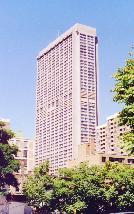
Sky high care: The Manulife Centre, where I'd once enjoyed Black Russians on the 51st floor. Terrell & Mark lived on the 35th. |
In Sunnybrook waiting on tests for possible lymphoma, Terell said he hoped that's what he had. "At least that would be fast."
It would not be fast. He would need help and he got it, a care team that would see many months with him.
I left ACT for other AIDS work, though I didn't think of it like that. It was just ordinary life, friendships, and I had friends now not at all well.
I had first met Terrell Cress in the smoking room at ACT's office at 464 Yonge. As usual there I had no idea what brought him in, maybe a counselling appointment. Later he was a volunteer, then on staff coordinating other volunteers.
At 464 he'd been just across the hall from me, at 399 Church just a few doors away. We worked on lots of things together, were both on the HIV Caucus, went for cigs together, beers after work at Trax where he'd play pinball with Dave Doig, sometimes to Colby's where, of course, he met Ricky.
We became each other's closest friend at ACT, an odd pairing: we had come very different routes through gay life. Terrell's had been more classic: hairdressing, catering, the high drug life of the '70s (he joked that the Ritalin he took now was the same speed he'd done then, if then not legally).
Looking at his photo album once I found shots of him from the early 1970s and only then realized I'd seen him in those days, and often -- at The Parkside.
He had always shunned politics but in fact had a sharp political mind. It was Terrell who had called to see if I concurred with the caucus's concise shot at Bob Martel in May. I think he may have written it. "You're not giving any reasons?" I'd asked then. "No. If they want our reasons they can ask." That was very Terrell.
***
He had gone off sick around the same time I did in 1992 but, as I had then, come back. In January he was in hospital, with pneumonia but not PCP. He'd been mostly off work since, in June back at Sunnybrook, Anita Rachlis his doctor, too.
I had visited him there then, his undiagnosed "chest thing" still bad but of course we went out for a cigarette. He'd gone home after that, and then had to go back.
- Monday, August 30, 1993, to Jane:
On Thursday I saw Terrell at Sunnybrook, reeling still from the impact of five diagnoses over two days: cysts in the lungs; cryptosporidiosis; CMV, probably inactive, in the lungs; CMV in the eyes; MAI, the disease Michael Lynch finally died of.
The interns were gung ho to treat all this right away; Terrell had to fight for time to figure it all out, was fighting still when I was there over whether he'd have a bone marrow tap to diagnose possible lymphoma.
He was better on Sunday, having started gancyclovir for the CMV in his eyes, the one treatment worth the trouble to keep him from going blind. So far he doesn't plan to treat anything else. The bone marrow tap was awful but he could still walk; the results will likely be in tomorrow. He said he hopes he does have lymphoma: at least that would be fast.
It would not be fast. I'd be with Terrell at Sunnybrook many times more, not to visit but to take him up to see Anita Rachlis, to get transfusions of gancyclovir, blood too when he was anemic, and in time for procedures more painful.
One was to put in a Portacath, a small chamber under the skin near his collar bone, a catheter inside leading from it into the subclavian vein, a tube outside letting visiting nurses do his gancyclovir drip at home, not having to stick him anew each time.
I would see him at home a day or two a week, sometimes more. He lived on the 35th floor of the Manulife Centre with his lover of seven years, Mark Raymond. Mark was a lawyer, and a volunteer working with support groups at ACT.
***
"It's hard to plan a life around death," Terrell once said -- meaning two lives: he'd been talking about Mark. I was relieved I didn't have a Mark, nice as he was, a sweet man but one now quite stressed.
Mark had an air of insecurity, as if he had done something wrong or suspected he would, some screw up that might irritate Terrell. He was confused, sad, very afraid, none of that a surprise. Both he and Terrell needed help.
By mid September a group of us had put together a care team, mostly from ACT: Ruthann and her lover Dougal, Dave Doig, Jim Tennyson (Mr Piano Man, once of TBP, recently among ACT's renegade volunteers), myself. There were other friends too, one living in Terrell's building.
We used the manual Andrew Johnson and I, and in the end Dave Doig, had produced. We would spend many months with Terrell.
***
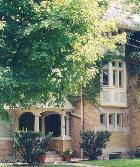
Old turf, new roles: Paul & David's place, with David now not quite so dogged. |
At every dinner any of us had ever seen with David, he'd clear the dishes, go wash them -- after 1987 out in the kitchen in the dark, alone.
Not this time. With a hand from Gerald, he went slowly off to bed.
In that August 30 letter to Jane, the paragraph I quoted above, about Terrell, was followed by this one.
-
On Saturday night David again didn't greet me at the door [as he had for years until just weeks before]. He'd had a shower earlier, had been sitting on the edge of the bathtub dressed after that, reached for something, lost his balance and fell backwards into the tub. He was there for ten minutes. Paul in the kitchen with the radio on couldn't hear him and he couldn't get out himself.
He was on the sofa when I arrived, had been there since the incident, hadn't tried to walk again yet. He needed help getting to the dining room. The bravado, for the night anyway, was gone. He was shaken, afraid. Paul was subdued. But at least now they will talk about how far things have gone. Paul wants to make sure that someone is always there when he's not.
David had got more withdrawn, less intent on controlling things. Over dinners he'd even let Ed Jackson and I talk ACT politics, though we were less inclined to now. But, even as he was losing the strength and control of his legs, he still insisted he could do things on his own. He was more willing to crawl around the apartment than ask anyone for a hand.
That fall hurt his pride but also made him admit, if just implicitly, that he needed help. When Paul told him Alan Miller and I were willing to spend nights at their place when Paul was away, as he often was with his consulting work, David didn't object.
***
On the Saturday a month later a whole slew of us were up for dinner -- Alan, Ed and his lover Sam, Gerald Hannon and myself -- to celebrate David's 48th birthday, his last we felt though of course no one said so. Paul made it a grand affair.
He and I had driven to Buffalo the week before, wine buying sprees there once common with David but this was the first since 1989, David not along but at home, someone there with him. Among Paul's coping mechanisms as he watched David and the life he'd had with him fade away was to go out and spend money. At Premiere Liquor, a vast place, he got 12 very good bottles.
The cute cashier running each one past the scanner popped his eyes at the prices appeared. At Canada Customs the clerk pecking figures into a computer to calculate the duty hit his last key -- then said with a start: "Holy shit!" One case: more than $4,000.
We drank three of those bottles that Saturday night, two Chateau Haut Brion, one Chateau d'Yquem, along with three others from the cellar, one of them champagne -- about $1,000 worth in all. Paul's true excess was his generosity: it was no fun spending money if you couldn't lavish the bounty on friends.
David had a taste of each wine but didn't last out dinner, leaving before cheese and sauterne. He needed help getting up from the table. He did not -- as he had at every dinner any of us had ever seen with him, since the '70s -- clear the dishes and go wash them, after 1987 out in the kitchen in the dark, alone.
With a hand from Gerald, a stop at the sofa along the way, he went slowly off to bed.
***
In 1991, Jane Rule had retired from writing, at least for publication. Two years before, her arthritis getting worse, she had begun taking anti inflammatory drugs that, as she said, turned her mind to snow, her imagination mere static on the screen.
Many were surprised, disappointed. "Most people," Jane later wrote, "apparently assume that artists must be artists to the lip of the grave, and they are incensed that anyone could be free to neglect a talent."
But she was free. Much of what she wanted to say, she realized, she had said already. Jane was wary of going on only to repeat herself, as too many veteran authors can do. "Twelve books," she said, "are a generous allotment of trees for one writer on this suffering planet."
At 62 she felt blessed to have her parents still in her life. They were very alive to me in her letters, with tales of trips to California to visit them, her siblings, nieces and nephews, and of their trips to Galiano.
Her letter of September 26 told of a week there with her parents, both swimming in the pool, going up to the Bluffs to watch ships in Active Pass, her father telling his usual bad jokes and hosting Helen's 77th birthday party at the nearby Woodstone Inn.
And then she said he had died -- creeping up on it so gently, I wrote her, "that I was stunned when I got to it, stopped reading for a minute or two, sat disturbed."
At 6 am on the morning her parents were due to leave, Jane was called upstairs by her mother and found her father collapsed in the hall. He had had a stroke, then a heart attack. He was taken by ambulance, land and water, to a hospital on Vancouver Island and there, six days later, he died. Jane said, "I don't know what my sorting out will be."
In her letter of November 9 Jane reported another death. Yara Hooley, one of the many kids I'd met at Jane's pool, now grown into her late teens, had lost control of her car, ending up in a lake on Saltspring Island in 15 feet of water. Yara had been her parents' only child.
Jane wrote: "My first furious reaction was, 'Damn it! I taught that kid to swim myself!' "
She then said: "It's been an obscene autumn."
***
At the beginning of this year, Queen Elizabeth had called 1992 her "Annus horribilis," royal marriages crashing, Windsor Castle going up in flames.
My horrible year was this one, 1993. I would come to call it The Year from Hell. Even having spent thousands of words here (a few of my letters to Jane this year nearly as long), I haven't told you all of it.
But this is enough for now.
The year would close with happier prospects: another bar, other boys, one boy in particular. He would be in my life, more or less, for quite some years to come.
Go on to 1994: Jan-Easter / Go back to Contents
This page: http://www.rbebout.com/bar/1993b.htm
January 2000 / Last revised: June 10, 2002
Rick Bébout © 2001 / rick@rbebout.com
